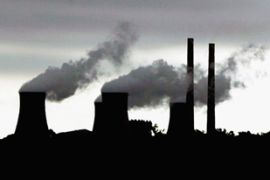Australia delays carbon trade plan
PM says delay in emissions cut plan will help businesses hit by global recession.

He said he still expected to see legislation on emissions reductions passed by parliament before the end of this year.
| In video | ||
|
“The worst global recession since the great depression means we must adapt our climate change measures but not abandon them,” Rudd said.
The highly-anticipated scheme was the most sweeping carbon emissions cap and trade scheme outside of Europe.
Under the scheme, originally due to start in July 2010, the government will introduce a charging system on companies that cause carbon dioxide emissions by issuing permits.
By limiting the number of permits available, it aims to reduce Australia’s carbon emissions which are some of the highest in the world on a per capita basis.
But industry groups had become increasingly concerned about the plan, saying it would add a further burden to companies already hit hard by the global recession.
Industries from aluminium smelters to airlines had complained that the original 2010 start date for the scheme would hamper recovery and destroy jobs at a time of rapidly rising unemployment.
Emissions target
Under the revised plan, Rudd said businesses would be helped by a one year fixed price of A$10 a tonne for the first 12 months.
 |
| Rudd said his government would look at tougher emission reductions [EPA] |
After that there would be a floating price with a transition to full market trading from July 1, 2013.
Announcing the changed timeframe for the scheme, Rudd said he was maintaining Australia’s interim emissions reduction target for 2020 at 5 to 15 per cent below 2000 levels.
But he said the government could increase the cut to 25 per cent if other rich nations agreed to similar reductions.
The proposal of tougher emissions cuts has been seen as an attempt to win over the influential Green Party, whose support could be crucial in passing the carbon trade scheme into law.
The government needs support from either opposition senators or the support of a group of independents and Greens to pass its plans through the upper house of parliament.
